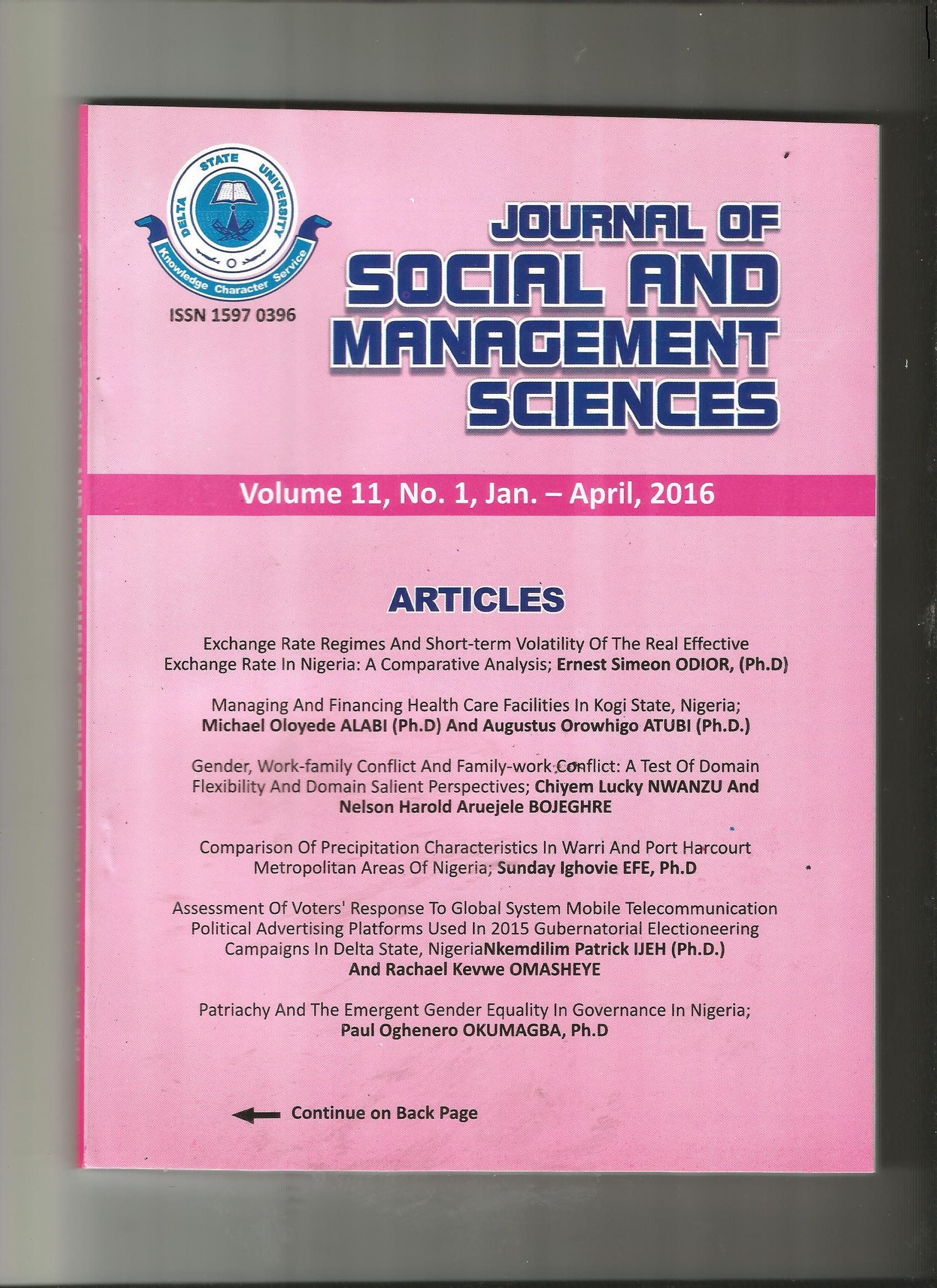
JOURNAL OF SOCIAL AND MANAGEMENT SCIENCES
Journal of the Faculty of Social Sciences, Delta State University, Abraka, Nigeria
ISSN: 1597-0396
DOI: 10.5987/UJ-JSMS
Email: jsms@universityjournals.org
POLITICAL CORRUPTION, CULTURE AND MORALITY IN NIGERIA: AN EXISTENTIAL ANALYSIS
DOI: 10.5987/UJ-JSMS.17.057.1 | Article Number: 822FFCC04 | Vol.12 (1) - April 2017
Author: EMINA Kemi
Keywords: Nigeria, Political Corruption, Existential Analysis
This papers looks at the incidence of political corruption in Nigeria and argues that the incidences of
political corruption is so well ingrained in the moral consciousness of the people, as some of our
traditional/cultural practices seem supportive of it. While reechoing the fact that Africa is not just the
least developed but actually the only continent backsliding among all other continent, opines that this
state of affairs seem to have led to the enthronement of multiple negatives in the country and Africa. To
curb corruption, it urges us to evolve a deep seated and very strong state institution, stressing that the lull
in limiting political corruption is traceable not only to the failure of the state not been able to consider
the moral fabric of the person seeking to climb the leadership ladder but to the absence of strong
institutions to drive the anti corruption offensive. The paper further insists that from all the analysis, it
appears that the only logical area of concern in the fight against corruption was to make the
consequences of a corrupt decision to be as harsh, dire and discouraging as possible Conclusively, it
contends that if the incidence of corruption is drastically curtailed, it will no doubt lead the country in
attaining great heights in all facets of human endeavor.
African Corruption 'on the wane', 10 July 2007, BBC News.
Alozieuwa S.( 2000). National Assembly's Show of Shame”. The Source, August 7.
Amujiri B.A.( 1997). “Bureceaucratic Corruption in Enugu State Civil Service and the Development o f t h e S t a t e : A n A s s e s s m e n t ” , A P h D Seminar paper presented to PALG, UNN, 1997. Chinhamo, Obert; Shumba, Gabriel (2010), Institutional Working Definition of Corruption, Anti-corruption Trust of Southern Africa, http://www.actsouthernafrica.org/workingpaper May 15.
Chukwumba O. and Okolo, A. (2000.) “End of Game for Okadigbo, Abubakar” Tell August 7. Dambazau, A. B. (1994). Law and Criminality in Nigeria, Ibadan: University Press Plc.
De Maria, William. (2005). Does African 'Corruption' Exist? Pretoria: Preton.
Dudley, B.J.( 1978.)Instability and Political order: Politics and Crisis in Nigeria, Ibadan: University Press.
Ekeh, P. (1975 ) Colonialism and the Two publics in Africa: A Theoretical Statement”. Comparative Studies in Society and History, 17: 1.
Eze Nwokekere. (2002). “The causes of corruption in Nigeria and the way forward” in C O.T. Ugwu (ed), Corruption in Nigeria: Critical perspective: A Book of readings, Nsukka: Chukka Educational publisher.
Gyekye, Kwame. (1997.) Tradition and Modernity: Philosophical Reflections on the African Experience, Oxford: Oxford University Press. Harriss –White B., & Harriss-White, G.( 1996.) Corruption, Liberalization and Democracy', IDS Bulletin, 27 1-5.
Hobbes, Thomas. 1994. Leviathan, or the Matter, form and power of a commonwealth Ecclesiastical and Civil, Edited by Edwin Curley, London; Hacket,
Ibrahim, J. (2001) “Manifestations and Impact of corruption on Nigerian society and Sustainable Democracy”, in I. Lame and F. Odekunle (eds), Fighting Corruption and Organized Crime in Nigeria: Challenges for the New Millennium, Abuja: Spectrum Books Ltd.
Ikejiani-Clark, M. (1995. )“Pathologies of Local Government Administration Corruption and Fraud”, in Ikejiani-Clerk, M and Okoli, F (eds) Local Government Administration in Nigeria: Current problems and future Challenges, Lagos: Man-groove publication.
Le Vine, Victor T.( 1975). Political Corruption: The Ghana Case, Stanford, California: Hoover Institution Press.
Nnoli, O., “Corruption and Political Development: A Cost-Benefit Analysis”, American Political Science Review, 61 (2).
Obi-Okagbuo, J. (2000). “The History and Aetiologogy of corruption in Nigeria: A critical Appraisal”, in Tile, W.S., (ed), Towards a Corrupt- free Democratic Society, Enugu: Vougasen Ltd., 15- 34
Ojeito, S.( 2002). “Electoral Bill, Senate Probes N100 Million Alleged Bribe”, Sunday Vanguard. Okeke, Veronica. (2002). “Corruption in Nigeria: A Theoretical Appraisal, in C.O.O Ugwu (ed), Corruption in Nigeria: Critical Perspectives: A Book of Readings, Nsukka: Chuka Educational Publishers,.
Olagunju, I., Jinadu A. and Oyovbaire, S.( 1993.) Transition to Democracy in Nigeria, 1985 – 1993, Ibadan: Spectrum Books Ltd.
